Prosecutor Says Lawyer Freed From Detention In Iran Committed Suicide

The public prosecutor of Sirjan in southern Iran has announced that a lawyer, who died two months after release from prison, committed "suicide by using medicinal products".

The public prosecutor of Sirjan in southern Iran has announced that a lawyer, who died two months after release from prison, committed "suicide by using medicinal products".
Maryam Arvin, who was arrested on September 26 during the Sirjan protests, was released on December 13 on bail.
Mohsen Nikvarz also claimed that Maryam Arvin, "had a history of suicide attempts by taking drugs, and her hospitalization and treatment records are available."
However, he did not mention any possible link between Arvin’s suicide and torture during the detention and interrogation reported in her case.
“Creating fake news is not new and for sure such lies and rumors will not be accepted by the people at all,” added the Sirjan prosecutor.
Arvin's case was appealed after a ruling by the preliminary court and was being discussed in the appeals court, he said and claimed that she was among those pardoned by the Islamic Republic ruler Ali Khamenei.
This is not the first time that a detainee commits suicide after being released from prison. In recent months, several other prisoners have died shortly after their release.
On Tuesday, Baluch Activists Campaign announced a teenager Benyamin Kouhkan arrested during protests has attempted suicide in Zahedan prison, southeast of Iran, due to severe physical, sexual and mental torture.
According to the human rights organization, the teenager was arrested by the Revolutionary Guard intelligence in Zahedan on January 3, but he tried to take his own life after being severely tortured.
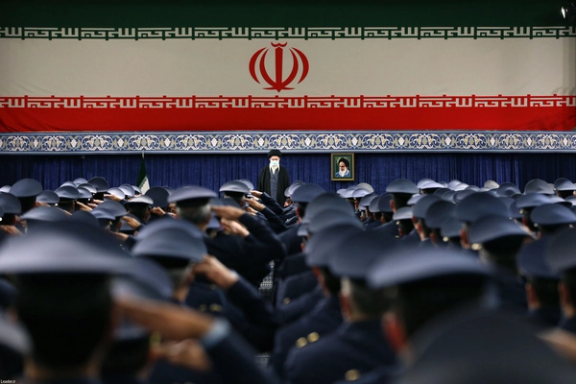
The Islamic Republic of Iran's Supreme Leader Ali Khamenei has for the first time admitted that there are disagreements between the people and the regime.
Khamenei who has been dismissing popular protests as “riots” instigated by “enemies” said in a speech that Iranians should "make sure these differences do not turn into faultiness" that would tear apart the nation.
Nonetheless, Khamenei's state of denial about dissent in Iran appears to continue. He repeated that sowing discord and creating differences is the "enemy's strategy."
"The enemy is determined to bring the Islamic regime to its knees," Khamenei said on Wednesday when tens of Iranian army's air force personnel went to visit him on the anniversary of a similar visit to the founder of the Islamic Republic Ruhollah Khomeini in 1979. The air force then paid tribute to Khomeini in defiance of their allegiance to the Shah, but the visit to Khamenei was not politically or otherwise significant.
He said, "15 years ago, a US President, [presumably George W. Bush] wrote to me in a letter that the United States did not intend to overthrow the government in Iran, but intelligence reports indicated that they were mulling a plot to destroy the Islamic Republic."
Reiterating that "the enemies" were adamant to sow discord and create distrust among the people, Khamenei advised that Iranians need to strengthen their unity to foil that plot. He claimed that the rallies to mark the anniversary of the Islamic revolution will manifest this unity.
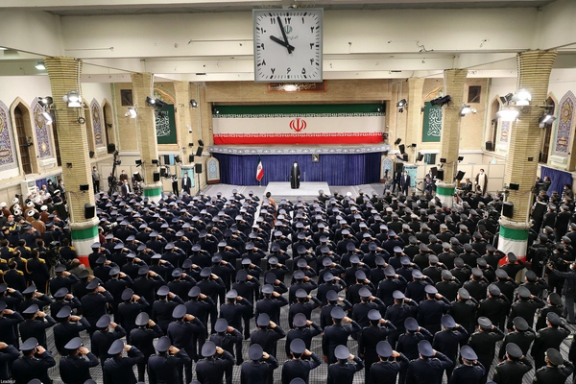
In fact, five months of protests in the streets against the government have left a fragmented society in Iran where trust in the regime is at its lowest point since Khamenei created his ideal all conservative government and barred others from taking part in the 2020 parliamentary and 2021 presidential elections.
Meanwhile, his insistence on the Islamic revolution being alive and kicking was in sharp contrast to months of protests by women and the youth demanding an end to the Islamic Republic. This time there is no doubt that protesters do not want any reforms or concessions. They demand a secular and democratic government and Khamenei is their first target.
But Khamenei sojourns in his own world and claimed that the Islamic Republic is moving forward toward the peaks of its material and spiritual progress. Material progress seems more like a myth as the government has recently decided to sell public assets and properties to finance its everyday administrative affairs. The national currency is at its historic low and inflation is well above 50 percent.
Meanwhile, sociologists and political observers in Iran have said in numerous studies that the generation-Z was the driving force behind the recent protests and most of those who were jailed for taking part in the protests were born after 2000. But Khamenei claimed that the regime has the hearts and minds of the young generation, showcasing a recent regime stunt of having youngsters in a Quran reading marathon.
In another controversial comment, while he has the final say on all matters of state and dictates all policies to the government, he called on unnamed officials to deliver what people need.
Khamenei also called for national unity, while he had earlier ruled out politicians' suggestions for an attempt at national reconciliation by putting an end to the violent crackdown on protesters.
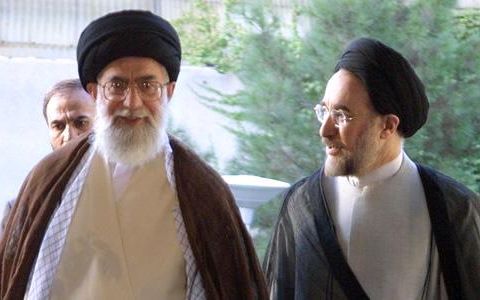
A prominent Iranian reformist figure says the Iranian regime should be worried as even ex-President Mohammad Khatami says that reformism in Iran has reached a deadlock.
The comment by Mohammad Javad Haqshenas comes as several conservative media outlets have attacked Khatami for his statement about the end of hope in reformismand his warning that disillusionment about reforms and the advocacy of regime change might lead to chaos, civil war and bloodshed.
In his statement on Sunday, Khatami had called on the government to meet the people's demands and prevent a revolutionary change.
Haqshenas said in an interview with Rouydad24 that Khatami's statement, which was issued on the 44thanniversary of the 1979 Islamic revolution sends a message that the Islamic Republic cannot be reformed. He added that the regime should take Khatami's statement as a warning and begin to reform itself from within.
On social media many argued that the fact that Khatami, former Prime Minister Mir Hossein Mousavi and former deputy Interior Minister Mostafa Tajzadeh have issued more or less similar statements warning that not reforming the system could lead to havoc was not a sheer coincidence. They suggested that the move was coordinated from within the system to scare the people of the consequences of the Islamic Republic's collapse.
Haqshenas on the other hand argued that reformists were expelled from the system as conservatives took over the executive, judiciary and legislative bodies. By doing so, the hard core of the regime made sure that it got rid of the challenges posed by reformists for good.

Meanwhile, Hossein Shariatmadari, the editor of hardline daily Kayhan said in an interview with the IRGC-linked Fars News Agency that "khatami's statement was no different from the US, UK and Israeli positions in support of recent protests in Iran. "Apart from cutting the throat of the police and attacks on the people in the streets, what have the rioters done that was different from what Khatami is suggesting?" Shariatmadari asked, questioning Khatami's support for protesters.
Resorting to his usual way of distorting the truth and putting words in others' mouth, Shariatmadari also asked: "Isn't it strange that Khatami as a cleric advocates the culture of nudity and supports the protesters' attack on veiled women as a beautiful act and a move toward a better future?" He added that "Khatami has suggested to the officials to be grateful for the rioters' presence in society."
Meanwhile, he once again accused Khatami of being linked to Israel and US entrepreneur George Soros without presenting any evidence.
In another development, conservative daily Resalat charged that Khatami's statement was "the starting point of a new phase in sedition." Sedition is the word Iranian hardliners use for the 2009 post-election unrest that nearly overthrew the Islamic government by rallying over three million people in Tehran against the ultraconservative establishment.
Another hardliner daily that attacked Khatami was IRGC's mouthpiece Javan newspaper that charged,"Regime change is the essence of the statements by Khatami and Mousavi." This comes while Khatami in a very elaborate way expressed his opposition to a regime change in Iran although Mousavi's call for a new Constitution could be easily interpreted as a call for regime change.
Javan wrote that both Khatami and Mousavi demanded regime change, undermining legal institutions in their statements. However, one of them [presumably Mousavi] demanded a hard regime change while the other called for a soft change of the regime. They are the two sides of the same coin."
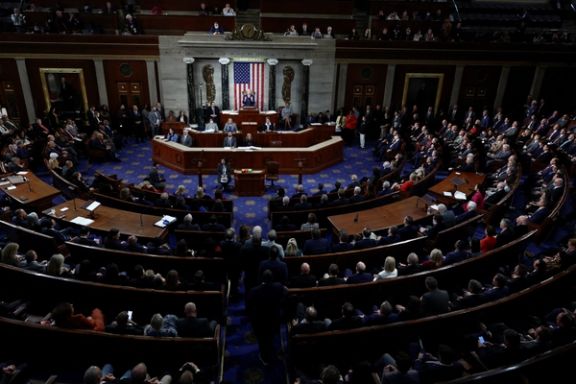
A large group of US Congresspeople have expressed support for a democratic, secular, and non-nuclear “Republic of Iran,” in a draft resolution that comes after five months of antigovernment protests.
Condemning violations of human rights and state-sponsored terrorism by the Iranian Government, the bipartisan group of Representatives submitted a resolution on Tuesday, which was referred to the Committee on Foreign Affairs. The motion was introduced by California's Republican lawmaker Tom McClintock and is cosponsored by 165 other representatives.
The resolution “calls on relevant United States Government agencies to work with European allies, including those in the Balkans where Iran has expanded its presence, to hold Iran accountable for breaching diplomatic privileges, and to call on nations to prevent the malign activities of the Iranian regime’s diplomatic missions, with the goal of closing them down and expelling its agents."
It also emphasizes that Washington “stands with the people of Iran who are legitimately defending their rights for freedom against repression, and condemns the brutal killing of Iranian protesters by the Iranian regime; and recognizes the rights of the Iranian people and their struggle to establish a democratic, secular, and nonnuclear Republic of Iran.”
The resolution mentions the popular antigovernment protests in 2017, which resulted in at least 25 deaths and 4,000 arrests, and the protests in November 2019, when about 1,500 people were killed during less than two weeks of unrest, as well as the current wave of protests ignited by the death of Mahsa Amini, a 22-year-old Kurdish Iranian woman who was arrested in mid-September 2022 by the morality police that enforce the regime’s mandatory dress code laws.
Noting that women and youth have led the 2022 protests in Iran to demand social freedom and political change, the resolution describes the uprising as “rooted in the more than four decades of organized resistance against the Iranian dictatorship.” The ongoing unrest have been most recently led by women who have endured torture, sexual and gender-based violence, and death.
It also mentions executions and death sentences in recent months and calls for measures to force the government to cease such repression.
In the 116th Congress, the House of Representatives passed House Resolution 752, "Supporting the rights of the people of Iran to free expression, condemning the Iranian regime for its crackdown on legitimate protests, and for other purposes,” it adds, urging the Administration to work to convene emergency sessions of the United Nations Security Council and to work with United States partners and allies to condemn the ongoing human rights violations perpetrated by the Iranian regime and establish a mechanism by which the United Nations Security Council can monitor such violations.
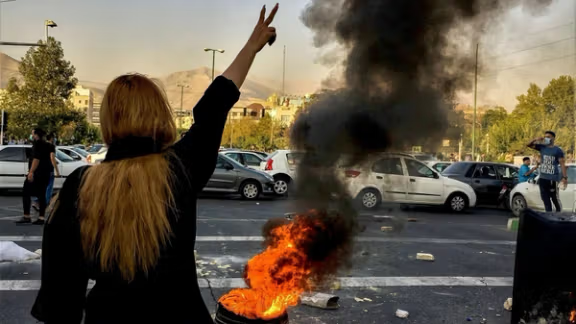
The resolution also mentions efforts by the international community against the crackdown on dissent in Iran, saying that on November 24, 2022, the United Nations Human Rights Council established a fact-finding mission to conduct an independent investigation into the ongoing deadly violence related to the protests in Iran that began on September 16, 2022. It also mentioned the resolution adopted by United Nations Economic and Social Council (ECOSOC) on December 14, 2022, to expel Iran from the Commission on the Status of Women (CSW) for the remainder of its 4-year term ending in 2026.
Enumerating other actions by the US against the human rights violations by the clerical regime, the House resolution referred to the Department of State’s 2021 Country Reports on Human Rights Practices, released on April 13, 2022, which cites that “Iran’s government and its agents reportedly committed arbitrary or unlawful killings, most commonly executions for crimes not meeting the international legal standard of ‘most serious crimes’ or for crimes committed by juvenile offenders, as well as executions after trials without due process.”
“On October 25, 2021, the United Nations Special Rapporteur (UNSR) on the situation of human rights in the Islamic Republic of Iran, Javaid Rehman, told the United Nations General Assembly that almost all executions in the country constituted an arbitrary deprivation of life, noting the extensive, vague and arbitrary grounds in Iran for imposing the death sentence, which quickly can turn this punishment into a political tool,” read the resolution.
The resolution also condemns the Iranian regime’s arbitrary and brutal suppression of “ethnic and religious minorities, including Iranian Kurds, Baluchis, Arabs, Christians, Jews, Baha’is, Zoroastrians, and even Sunni Muslims,” noting that it deprived them of their basic human rights, and has in many cases executed them.
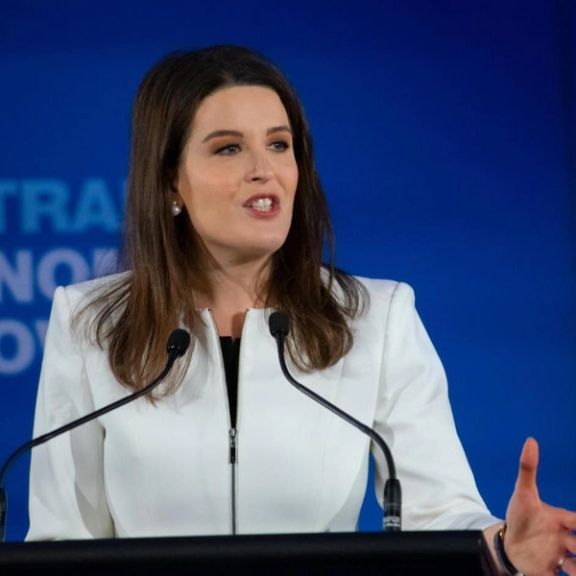
A group of German parliamentarians gathered outside Iran’s embassy in Berlin to express support for the Iranian protesters calling on the regime to release detained demonstrators.
The German lawmakers also urged the authorities of the Islamic Republic not to issue or carry out death penalties against the prisoners.
Meanwhile, a group of Australian Senators and members of House of Representatives also demanded more pressure on the Islamic Republic.
Senator Claire Chandler told Iran International that “we want to see the IRGC listed as a terrorist organization... We want to make very clear to the world that we are concerned about the human rights abuses that are happening in Iran.”
Senator Jordon Steele-John also told Iran International’s correspondent that “Australia has been very slow in acting and very hesitant to act… It took more than three months for Australia to do anything like what it should have done. So we welcome finally the imposition of broader sanctions.”
On the other hand, Member of Parliament Keith Wolahan stated that the Australian Attorney General's Department has said there were legal [restraints] to list the IRGC as a terrorist organization, [but] if that is the case, we call on the government to introduce a bill to the House of Representatives.”
Iran has witnessed nationwide protests since mid-September after Mahsa Amini was killed in police custody. Over 500 protesters have been killed by the regime forces and thousand are arrested.
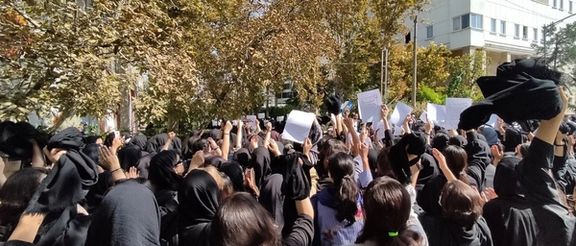
A letter leaked by a hacktivist group to Iran International reveals details about the rape of two female protesters, aged 18 and 23, by IRGC agents.
Obtained by the hacktivist group Edalat-e Ali (Ali's Justice), the document clearly shows how the Iranian government’s repression machine covers up rape and sexual abuse by its agents.
Edalat-e Ali has been leaking sensitive information about Iran’s security forces and conditions in prisons.
Reports about detained protesters began trickling in in November and since then there have been many victims and families who have disclosed what happened to them.
Alireza Sadeqi and Alireza Hosseini are two IRGC agents referred to in a letter dated October 13, 2022, from Mohammad Shahriari, deputy prosecutor and head of General and Revolutionary Courts, district 27, to Ali Salehi, prosecutor at Tehran General and Revolutionary Courts, about the arrest and the subsequent rape of the two women.

Agents, who rape with impunity
As the deputy prosecutor informs his superior in the letter, the two women contact police station No. 124 in Tehran and report being arrested and then raped by agents on October 3.
Shahriari instantly notes that the two women’s complaint has not been registered after “coordination with Hefa [Persian acronym for the police intelligence agency]”.
It is also mentioned that a person, allegedly an agent, named Alireza Sadeqi has been detained along with his father at their home in Tehran’s Pirouzi street, where loads of batons, ammunitions, bulletproof jackets, police radios, handcuffs, IDs for different organizations such as the Law Enforcement Command (police), IRGC and the Judicial system have been found as well as a hoard of dollar bills and drugs.
Alireza Hosseini, an IRGC captain in charge of the intelligence division of Imam Hassan unit, was also arrested and transferred to a prison belonging to a police intelligence unit, the letter continues, adding that his motorbike had been found in the house of the “accused [previously] detained”.
In the letter it is not clear exactly how the two agents were identified and arrested.
The letter further details how they admitted to raping the two women, with Sadeqi acknowledging that they detained the two women near a gas station while on a mission in Sattarkhan street, in western Tehran.
Superiors ordered them to free the women because at the time there were no facilities available for their detention. Apparently, the accused took the women back to where they were picked up and that is when the rape took place.
Confessing to raping the women, Sadeqi argued that it was one of the women who initiated sexual advances in the car and that he recited “Sigheh”, a private and verbal temporary marriage contract which is supposed to make an intercourse religiously permissible. He also dropped the names of his colleagues, Alireza Hosseini, Hojjat Keivanlou and Ali Shahroudi, alleging that they might have raped the other woman, according to the letter.
Alireza Hosseini, however, refused to admit to any sexual abuse at first, stating that the arrests were made based on suspicions that the women were protesters.
He later confessed to the crime by saying: “I saw Sadeqi speaking to one of the female detainees and advised him to keep his distance. After a couple of minutes, I saw him groping [NAME REDACTED]’s back. I told him to stop but he pushed the second girl, named [NAME REDACTED], towards me. I shook my head in disbelief, wondering what’s going on!’”
His subsequent testimony appears to recount how Sadeqi coerced the woman to have oral sex as he was “standing with the front side of his pants pulled down and [NAME REDACTED] was busy…”.
About his own case, Hosseini pointed the finger at the woman, alleging that she said, “For God’s sake, let us loose,” while undoing his fly.
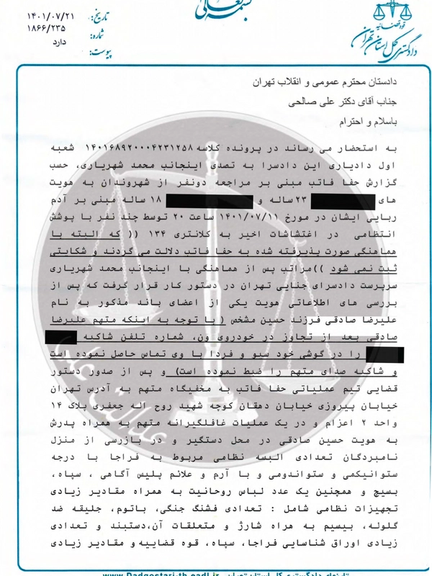
Attempt to defend abusive agents
In a blatant attempt, to understate the agents’ misconduct in the document, the deputy prosecutor concludes that “the defendants merely formed a gang for extortion or abduction and committed criminal acts”. In this part of the letter, terms such as “independent detention centers”, “torturing of people”, “extortion” and “widespread relationship with women and girls” stand out.
The document finally reveals how the Islamic Republic’s repression machine shuts down cases related to sexual misconduct by agents as it reads: “Considering the problematic nature of the case, the possibility of this information being leaked to social media and its misrepresentation by enemy groups, it is recommended that necessary orders be issued for it to be filed in the ‘Top Secret’ category. Since no complaint has been registered and the defendants have been dismissed, it is advised that the case is gradually closed without any reference to the involved military institutions.”
Since mass demonstrations began in Iran in the wake of Mahsa Amini’s death in the hands of the so-called morality police last September, multiple reports have been released, offering evidence of rape and sexual abuse of female protesters from the time of detention to interrogations. There have also been reports suggesting that security forces target women with shotgun fire to their faces, breasts, and genitals.
The latest document adds to a trove of evidence that Iran’s security forces, engaged in torture and sexual violence, can act with impunity to advance the Islamic Republic’s repression of dissent.